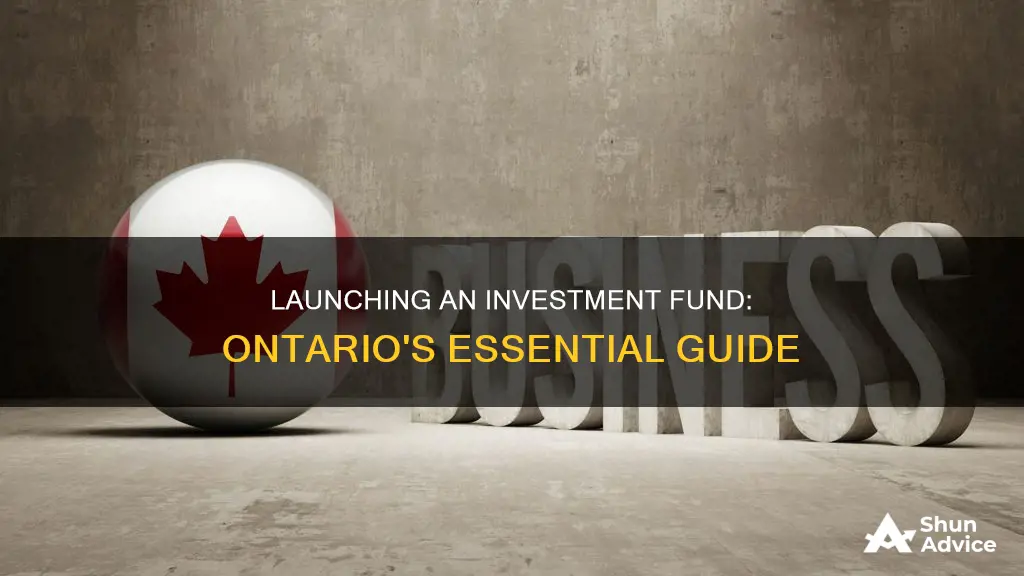
Starting an investment fund in Ontario, Canada, is a complex process that requires careful consideration of legal, regulatory, and financial requirements. The financial industry in Canada is highly developed, with the investment funds sector being particularly successful and attracting many international financial companies and young entrepreneurs. Those seeking to establish an investment fund in Ontario must navigate various regulations, including those specific to the province and others that apply nationally. This includes compliance with the National Instrument on Investment Funds, legislation on mutual funds, commodity pools, and investment fund sales, prospectus regulations, and provincial marketing rules. Founders must also register their fund with the relevant securities regulator and meet specific capital requirements, which vary by role.
| Characteristics | Values |
|---|---|
| Regulatory Body | Canadian Securities Administrators (CSA) |
| Regulatory Requirements | National Instrument on Investment Funds, legislation on mutual funds, commodity pools, investment fund sales, and prospectus regulations |
| Registration | Required with the CSA; must also register as a financial advisor and/or dealer if providing investment advice or selling securities |
| Compliance | Ongoing reporting requirements to provincial regulators; compliance with regional laws on insider trading, conflicts of interest, proxy voting, financial terrorism, money laundering, and personal privacy |
| Financial Statements | Annual audited financial statements to be provided to investors and regulators within 90 days of year-end; semi-annual unaudited financial statements to be provided within 60 days of the interim period-end |
| Capital Requirements | Minimum requirements vary by role and province, e.g. CAD 25,000 for a portfolio manager, CAD 50,000 for an exempt market dealer, and CAD 100,000 for an investment fund manager in Ontario |
| Marketing | Two options: use a prospectus or not; prospectus outlines investment strategy, risks, structure, etc., while not using one allows more flexibility but limits investors |
| Target Investors | Accredited investors such as government agencies, institutions, and high-net-worth individuals; investors who meet a minimum investment threshold of CAD 150,000 |
| Fees | Management fees typically range from 2% to 2.2% of the fund's capital; performance fees range from 15% to 25% of profits |
What You'll Learn

Regulatory requirements
Registration and Regulatory Bodies:
- The Ontario Securities Commission (OSC) is the primary regulatory body overseeing investment funds in Ontario.
- Any firm or individual managing the day-to-day operations of an investment fund in Canada must register with the relevant securities regulators. This includes registering as an ""investment fund manager" or "portfolio manager."
- Additionally, individuals or firms providing investment advice must register as a "financial advisor," and those selling securities must register as a "dealer."
- The OSC also promotes compliance with Ontario's Securities Act and Commodities Futures Act, as well as related rules and instruments.
Investment Fund Types and Their Requirements:
- Mutual Funds: These are funds whose securities are redeemable at net asset value. They have specific requirements, including investment restrictions, conflicts of interest rules, and custodianship of portfolio assets.
- Non-redeemable Investment Funds: These funds have a primary purpose of investing money provided by security holders. They are not required to register as a portfolio manager if their advice is incidental to their active management of the fund's investments.
- Scholarship Plans: These are investment funds designed for education savings and are subject to National Instrument 41-101 General Prospectus Requirements.
- Labour-Sponsored Investment Funds (LSIFs): LSIFs are registered under the Community Small Business Investment Funds Act and promote investments in smaller companies. They are exempt from many investment restrictions.
- Hedge Funds: Hedge funds are highly regulated and transparent in Canada. Founders must meet strict regulatory requirements and be in ongoing compliance. There are minimum capital requirements for registration in each province or territory.
Day-to-Day Operations and Compliance:
- Investment funds in Ontario must comply with regulatory requirements in their day-to-day operations. These requirements cover areas such as investment restrictions, initial investments, conflicts of interest, custodianship of assets, sales and redemptions of securities, and risk classification.
- National Instrument 81-106 Investment Fund Continuous Disclosure (NI 81-106) sets out rules for the calculation of a fund's net asset value and management expense ratio.
- Ongoing disclosure requirements: All investment funds operating in Ontario must comply with ongoing disclosure rules, as outlined by the OSC.
- Marketing and Sales: The OSC regulates the marketing and sales activities of investment funds, ensuring compliance with relevant requirements.
- Compliance and Reporting: Registered individuals and firms are subject to ongoing compliance and reporting requirements, including financial reporting to investors and regulators.
Please note that this is not an exhaustive list, and it is important to refer to the relevant regulatory bodies and seek legal advice when establishing an investment fund in Ontario to ensure full compliance with the regulatory requirements.
Property Funds: A Smart Investment Strategy for Diversification
You may want to see also

Registering the fund
Registering an investment fund in Ontario involves several steps and requirements. Here is a detailed guide on registering an investment fund in the province:
Regulatory Requirements:
Firstly, it is essential to understand the regulatory landscape in Ontario. Investment funds in Ontario are subject to various regulatory requirements that govern their day-to-day operations. These requirements are outlined in specific legislation and instruments, such as the National Instrument on Investment Funds (NI-81-102) and the Ontario Securities Act. The Canadian Securities Administrators (CSA) is the main authority overseeing the establishment and operations of investment funds in Canada, and each province has its regulatory body, with Ontario's being the Ontario Securities Commission.
Registration Process:
To register an investment fund in Ontario, the following steps should be taken:
- Determine the type of fund: Decide on the type of investment fund you want to establish, such as a mutual fund, hedge fund, or private equity fund. Each type of fund has different regulatory requirements and restrictions.
- Comply with legal and regulatory requirements: Familiarize yourself with the National Instrument on Investment Funds, legislation related to mutual funds, commodity pools, and investment fund sales, prospectus regulations, and provincial regulations on marketing investment funds. Ensure you understand the restrictions and operational requirements that apply to your specific type of fund.
- Prepare the necessary documentation: This includes preparing the prospectus of the fund, the annual information formulary, information about each type of financial instrument the fund will market, and details about the fund manager. The prospectus outlines the fund's investment strategy, risks, structure, and other key components.
- Register with the CSA: Submit the prepared documentation to the CSA for review and approval. This step involves filing the necessary forms and meeting the specific requirements of the CSA.
- Comply with ongoing reporting requirements: Once registered, investment fund managers are subject to ongoing reporting obligations to provincial regulators. This includes providing regular financial statements to investors and adhering to laws and regulations related to conflicts of interest, insider trading, and other relevant matters.
- Raising capital: After registering the fund, focus on raising capital from investors. In Ontario, there are minimum capital requirements for different roles, such as CAD 25,000 for a portfolio manager and CAD 100,000 for an investment fund manager.
It is important to note that the registration process may vary depending on the specific type of investment fund and the regulatory body's requirements in Ontario. It is always advisable to consult with legal and financial professionals specializing in investment fund formation to ensure compliance with all applicable laws and regulations.
Strategies to Attract Investors to Your Fund
You may want to see also

Raising capital
When raising capital for your investment fund in Ontario, you should be aware of the different types of investors you can target. Accredited investors, such as government agencies, institutions, and high-net-worth individuals, are a common source of capital. These investors typically have a minimum net worth or income requirement, such as $1 million in net worth or $250,000 in annual income. Additionally, you can target investors who are willing to invest a minimum amount, such as $150,000, in your fund.
Another option to consider is setting up a private equity fund, where you raise capital from Limited Partners. In this structure, the General Partner, also known as the Managing Partner, is responsible for managing the fund and making investment decisions. The General Partner may also contribute their own capital to align their interests with the Limited Partners. Management fees are typically charged, ranging from 2% to 2.2% of the fund's capital, and performance fees are paid to the General Partner for positive returns, typically ranging from 15% to 25% of profits.
When establishing an investment fund in Ontario, it's important to comply with the relevant laws and regulations. The National Instrument on Investment Funds sets out restrictions and operations for investors, while there is also specific legislation for mutual funds, commodity pools, and investment fund sales. Additionally, you need to adhere to prospectus regulations when creating closed-ended or open-ended investment funds. It's important to work with legal and financial professionals familiar with the regulatory environment in Ontario to ensure compliance.
Lastly, when raising capital, it's essential to have a strong investment thesis and a well-defined strategy. You need to be able to articulate your fund's investment approach, target market, and expected returns to potential investors. A clear and compelling investment proposition will make it easier to attract capital from investors who align with your fund's strategy and objectives.
IRA Funds: TD Ameritrade Investment Strategies for Beginners
You may want to see also

Marketing the fund
Marketing an investment fund in Ontario involves several steps and considerations. Here is a detailed guide:
Understanding the Regulatory Landscape
Before marketing an investment fund in Ontario, it is crucial to understand the regulatory requirements. In Canada, the Canadian Securities Administrators (CSA) is the primary authority governing the establishment and operations of investment funds. Each province, including Ontario, has its own securities regulator with specific rules and requirements. Ensure you are familiar with the regulations set by the Ontario Securities Commission, especially those pertaining to investment funds.
Creating Marketing Materials
When developing marketing materials for your investment fund, it is essential to provide prospective investors with key information about the fund. This includes creating a comprehensive prospectus that outlines the fund's investment strategy, risks, structure, and other critical components. The prospectus is a crucial document that informs investors about the fund's approach and helps them make informed decisions.
Complying with Prospectus Regulations
In Canada, there are specific regulations around creating closed-ended and open-ended investment funds. These regulations vary depending on whether you plan to market your fund publicly or privately. Ensure you understand the applicable regulations and comply with the necessary disclosure requirements when creating your prospectus.
Identifying Target Investors
Ontario offers a diverse range of investment opportunities, catering to various investor profiles. Identify your target investor segment, whether it's institutional investors, high-net-worth individuals, or retail investors. This will help you tailor your marketing efforts and create targeted messaging that resonates with your audience.
Building a Strong Value Proposition
Clearly articulate the value proposition of your investment fund. Highlight the unique benefits and advantages that set your fund apart from others in the market. This could include the fund's investment strategy, track record, risk management approach, or any other factors that make it attractive to potential investors.
Utilizing Digital and Traditional Marketing Channels
Leverage digital marketing tools such as a dedicated website, social media presence, and online advertising to reach a wider audience. Additionally, consider traditional marketing methods such as print advertisements, attending industry conferences, and networking events to build relationships with potential investors.
Complying with Ongoing Disclosure Requirements
As a fund manager in Ontario, you are subject to ongoing reporting and disclosure requirements. Ensure that you provide regular updates and financial statements to investors and comply with the applicable laws and regulations. This fosters transparency and helps maintain trust with your investors.
Marketing an investment fund in Ontario requires a comprehensive understanding of the regulatory environment, effective communication of your fund's value proposition, and strategic use of marketing channels to reach your target investor audience. By following these steps and maintaining compliance with the applicable regulations, you can effectively promote your investment fund in the province.
Stash Invest Account: Funding Your Future in a Few Steps
You may want to see also

Complying with securities laws
To comply with securities laws when starting an investment fund in Ontario, there are several regulatory requirements that must be met. These requirements vary depending on the type of investment fund being established. Here is an overview of the key considerations:
Firstly, it is important to understand the relevant regulatory bodies. In Ontario, the main authority governing the establishment and operations of investment funds is the Canadian Securities Administration (CSA). Each province in Canada has its own securities regulator, and Ontario's authority is called the Ontario Securities Commission (OSC).
The specific requirements for your fund will depend on whether it sells securities to the public or not. Mutual funds and non-redeemable investment funds that offer securities to the public must comply with the following legislation and instruments:
- National Instrument 81-102 Investment Funds (NI-81-102), which covers areas such as investment restrictions, conflicts of interest, custodianship of portfolio assets, sales and redemptions, and investment risk classification methodology.
- National Instrument 81-106 Investment Fund Continuous Disclosure (NI 81-106), which includes requirements for calculating a fund's net asset value and management expense ratio.
- National Instrument 81-107 Independent Review Committee for Investment Funds (NI 81-107), which relates to the establishment and operation of investment fund independent review committees and their oversight of conflicts of interest.
- National Instrument 31-103 Registration Requirements and Exemptions (NI 31-103), which covers conflict of interest matters involving investment funds.
- Ontario's Securities Act, which also includes provisions related to conflict of interest matters involving investment funds.
Specialized investment funds, such as scholarship plans, may be subject to additional or separate requirements. For example, scholarship plans are subject to National Instrument 41-101 General Prospectus Requirements.
If your investment fund does not sell securities to the public, it will generally be subject to fewer regulatory requirements. However, there are still some day-to-day operational requirements that must be met, including compliance with NI 31-103, NI 81-106, and Ontario's Securities Act, particularly in relation to conflict of interest matters.
It is important to note that the requirements outlined above may vary depending on the specific type of investment fund being established. Therefore, it is essential to seek legal advice and consult with the relevant regulatory bodies to ensure full compliance with securities laws when starting an investment fund in Ontario.
Best Mutual Funds to Invest in the USA
You may want to see also
Frequently asked questions
The following types of funds can be set up in Canada: retail and non-retail funds, open and closed-ended investment funds, hedge funds, and exchange-traded mutual funds (ETFs).
The main authority governing the establishment and operations of Canadian investment funds is the Canadian Securities Administration (CSA). To create an investment fund in Canada, investors must comply with the National Instrument on Investment Funds, legislation on mutual funds, commodity pools, and investment funds sales, prospectus regulations, and provincial regulations related to marketing investment funds.
It is important to understand the legal and practical considerations, including the contributions and alignment of interests between the Limited Partners and the General Partner. Private equity managers or the fund itself must be registered as a Dealer, Adviser, or Manager with the securities regulatory bodies.
Investment funds in Ontario are subject to regulatory requirements that cover areas such as investment restrictions, initial investments in mutual funds, conflicts of interest, custodianship of portfolio assets, sales and redemptions of securities, and investment risk classification methodology.
Invest Ontario provides comprehensive support to global businesses looking to invest and grow in the province. They offer services such as access to business support services, priority access to government services, assistance with labour force needs, partnership opportunities, and regulatory connections and permit coordination.







